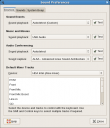So I been pining in front of the mailbox everyday since middle of last week. The reason is that in order to progress on setting up here in the UK I need the utility bill as a proof of address. Specifically I am not able to get a bank account without it which in turn holds up a lot of other things.
Where to report a bug
Noticed suddenly that with the latest Fedora kernel update my network card stopped working properly. Booting into the previous kernel it still works fine. But having this problem I realized once again the pain of reporting bugs in some of the lower level modules. In this case I feel belongs clearly in the Red Hat bugzilla due to it being only Red Hat kernel patches which have changed between the two modules in question.
But I have filed a lot of bugs there over the years and Red Hat’s engineers are understandably not to keen in being bug report routers. On the other hand Red Hat, Novell, Ubuntu etc., is going to be the only entity known to a lot of linux users coming in now and expecting them to figure out and file bugs/send emails etc., to various upstream groups and projects is not very likely to happen. This could be either a blessing or a curse I guess. For someone being involved with GStreamer I guess the fact that only people cluefull/interested enough to figure out that there is such a thing as GStreamer on their system and also understanding it has a separate bugzilla will mean that even as the user population grows the project will not get swamped in ‘useless’ bugs, as the people filling bugs have already shown some technical understanding by figuring out where to file it. On the other hand one can also easily risk that important bugs never reach upstream and instead goes to the great bugzilla limbo that can be distro bugzilla’s.
There are a few things I have been hoping to see in the bug tracker space for a long time. The first is a way to mark a bug as depending on upstream bugfixes. I mean getting a patch into a driver or upstream library is often of little help unless that bugfix makes it into your distro’s package (unless you want to roll your own files, but then you run the risk of losing your fixes everytime you update the system unless your careful). Being able to have Red Hat bugzilla mark a bug in GNOME bugzilla as a prereq would be nice for instance.
The other is a good way to figure out where to file bug reports. I mean I know some bugzilla’s and other bug trackers out there, but there are shitloads of projects I have no clue on how handle bugs. And some of the projects that theorectically have a bugzilla, like some freedesktop projects, do not seem to use it, so filing a bug there is next to useless. Maybe it would be possible for the distro packagers, who hopefully have some contact with the upstream projects to add some kind of bug reporting info to their packages. But even that takes you so far as for example with the kernel I often get the feeling you need a specific developers name and home phone number if you want to report a bug :)


